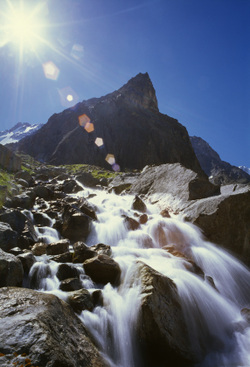
I asked the audience “How many of you watched the winter Olympics at Sochi when you should have been reading Greek or Latin?” A few hands went up, including my own.
“Come on, tell the truth.” A few more hands went up.
“You have a chance to redeem yourselves by answering a question and solving a riddle.”
The Question: Which work of ancient literature is set in or near Sochi?
After a silence, a bright student said, “Aeschylus’ Prometheus.”
“Which Prometheus? He wrote three of them.”
“Prometheus Bound.”
“Good. Now the riddle.”
The Riddle: How are the Classics like Prometheus?
Lots of suggestions came. The one I liked best was, “Because administrators keep trying to rip the guts out of us, but don’t succeed.”
“Here’s another way to approach the riddle,” I suggested. “Did you ever notice who comes to visit Prometheus up there in the Caucasus? Oceanids and their daddy, and then poor wandering Io, and finally Zeus’ errand boy, Hermes. These are all on the move, unconfined to any one spot -- in one way or another, unbounded. Oceanus is a good example: “I come/ on a long journey, speeding past the boundaries / to visit you, Prometheus …”(lines 279 f.).
So, in this play bounded confronts unbounded. Is there an analogy to Classics? Sure, in this respect: Classics is both chronologically and geographically bounded. What’s more, Classics is the only field that by definition is so bounded. All the others can move forward or back, earlier or later, north or south, east or west, whatever they choose. English can go back to the roots of Old English, or up to the lyrics of Gangsta Rap. Scholars in the field can journey with Chaucer to Canterbury, or whisk off to Australia, India, the Falklands, wherever English is spoken. Similarly with History, or Musicology or Philosophy, or Near5 Eastern Studies, or –well, you get the point. Meanwhile, Classic, like Prometheus, is confined to its remote mountain peak.
What a disaster!
But wait a minute. Prometheus is determined to tough it out, until Zeus relents. Could being bounded possibly be a good thing for Classics?
“It keeps you focused.”
“You don’t have to run around in circles all the time.”
True enough and Classics is not subject to the dynamic of growth that often shapes the unbounded fields of academia. Their incentives all push toward the contemporary. That’s the low-hanging fruit. Over time departments in the unbounded fields are tempted to move toward whatever is new and easy to explain to students. Earlier periods get compressed or dismissed, staffing shifts toward the present. When the past survives, moreover, it is judged by the standards of our time. “Presentism” takes command. That’s not a story about Classics; it’s is about the whole of human experience until very recent times. Medieval, Renaissance and Enlightenment studies all suffer, -- and not just European civilization. The roots of all cultures are in danger of being left neglected and parched.
Today you can see that happening in many colleges and universities. If that continues the result will be that the study of the past is eviscerated, and students attain only a very impoverished education. It’s not easy to stand up against that, but when, as Prometheus puts it, “Classics is an anchor to windward when, as Prometheus says, “all the winds’ blasts / dance in a fury” (1085 f. trans, David Grene), Classics is an anchor to windward.
 RSS Feed
RSS Feed
